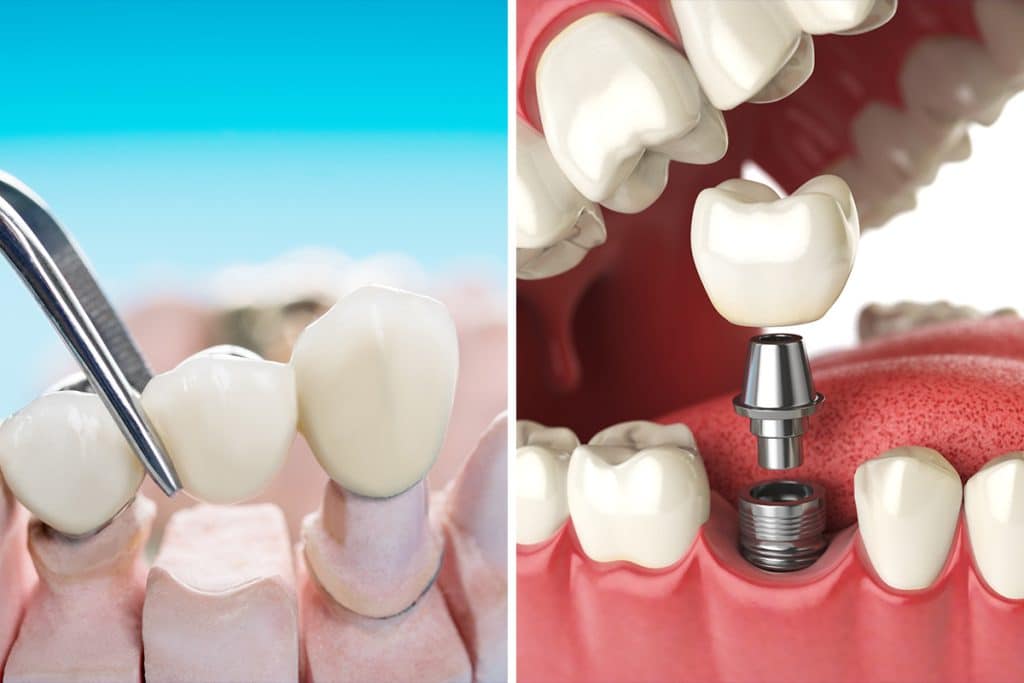Dental Bridges vs. Implants

When it comes to replacement teeth, you have choices. The two main options are dental bridges and dental implants. Both of these methods of replacing lost or damaged teeth provide functional restorations. Which option is best for you? Learn more from Amarillo Dental Associates so you can make a fully informed decision.
What is a Dental Bridge?
A dental bridge can replace anywhere from 1-4 teeth in a row. A traditional bridge consists of two crowns with one or more pontics (artificial teeth) suspended between them. The crowns fit over the healthy teeth on each side of the gap, using them for support. The pontics sit on top of the gums.
What is a Dental Implant?
A dental implant is an artificial tooth and root replacement. The implant is surgically placed in the jaw where it fuses with the bone to form a solid bond that acts like a natural tooth root. A dental crown is attached to the implant to provide a natural look and function.
Pros and Cons of Dental Bridges
Pros:
- Non-invasive
- Provides a solution for patients with limited bone density in the jaw
- Restores chewing capability
- Fills gaps in your smile
- Can be placed in 2-3 appointments
Cons:
- Removal of enamel on support teeth
- Higher risk of damage to the support teeth over time due to the force of chewing
- Average lifespan is 15-25 years
Pros and Cons of Dental Implants
Pros:
- Strong support for dental prosthetics
- Provides natural chewing capability
- Won’t damage your healthy adjacent teeth
- Lasts for 30 years to a lifetime
Cons:
- Can take months of healing to complete the restoration
- Requires sufficient bone density and space to be placed successfully
- Costly, and may not be covered by all insurance plans
Choosing the Right Option For You
There are many things to take into consideration when it comes to choosing a tooth replacement option. Overall, dental implants are considered to be a higher quality restoration than a dental bridge. Dental implants provide a more natural function and appearance than a dental bridge. Implants also last longer than bridges.
However, if budget is your primary concern, dental bridges cost less and are more likely to be covered by insurance. Also, if you have bone loss in the space due to the absence of the tooth or teeth, you can still get a dental bridge without any modification of the bone in the space.
Options for Replacing Multiple Teeth
If you have a significant number of teeth that are missing or too damaged to be saved, implant supported bridges and dentures provide a secure solution. Implant supported bridges don’t use the existing teeth for support, making them less risky than traditional bridges. Implant supported dentures are more secure and comfortable than traditional dentures.
Frequently Asked Questions About Bridges and Dental Implants
Is a dental bridge removable?
No, a bridge is fixed to the support teeth and can generally only be removed by your dentist for replacement with a new restoration. You can still brush, floss, and clean under it along with your other teeth.
Does dental implant placement hurt?
Dental implants can be placed with the usual local anesthesia to numb the area similar to getting a filling. If you are nervous or anxious, sedation can be provided to help you feel more comfortable and relaxed.
Schedule a Consultation Today
If you would like to discuss your tooth replacement options with Amarillo Dental Associates, please schedule a consultation today. Call 806-355-7463 or contact us to learn more and make an appointment.
